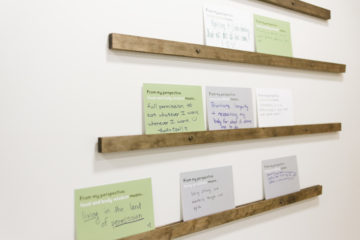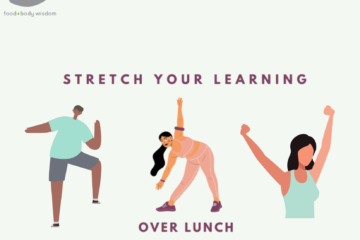
Dear Coach,
Let’s get re-acquainted.
I know there’s been some tension in our relationship and I’m hoping we can clear the air by getting to understand each other better.
This is what I assume about you: you are doing your best. period. I also assume that some days you probably enjoy the influence you have with your athletes and some days you wish you didn’t hold so much power. Or, maybe you don’t even know how much power you have?
I also assume that you haven’t had much training with body image issues and disordered eating. I imagine it is tempting to not say anything on this subject for fear of saying something “wrong”. And, if you do give nutrition advice or tell an athlete to change their weight, I assume you are well-meaning and believe this advice will help your athlete.
I also assume you have a lot of pressure about how your athletes perform. I can’t imagine how difficult it would be to hold that responsibility. I think that type of pressure would certainly impact your decision-making, and maybe lead you into murky waters as a coach.
Lastly, I assume there is so much I don’t know about your reality. As a fellow human, you have your own personal life that impacts you on a daily basis, both for the positive and the difficult.
I hold a lot of empathy for you.
To be honest, this hasn’t always been the case.
As an athlete, I adored you.
In my recovery process from an eating disorder, I felt confusion, anger towards you, and didn’t know how to make sense of our relationship and the power you held in my life.
Now, many years later, as a mental health provider and eating disorder specialist, I can fully appreciate the complexity of the relationship between you and I.
Let’s go back..
When I was an athlete, I adored you. I would give anything to make you proud of me and would do anything you told me (or that I perceived you wanted from me). I wanted your attention and quickly perceived that being a top athlete would secure my relationship with you. So, I tried hard…very hard…and did everything in my power to be the fastest I could be. By following the “practices” of the faster, older teammates, I introduced food restriction into my life. It started slowly, but the ramp-up was disturbingly quick. I ate less, less, less, and at the same time, my times dropped and dropped to the point where I was on the podium for a championship meet.
Now, let’s be clear, that year was a blast! I didn’t know I had a problem. In fact, I thought I was the subject of some sort of miracle, God-thing that took over my body and allowed me to race so quickly. But the subsequent years proved otherwise. During the next year’s season, was my first nightly food binge and then….as fast as I had fallen into food restriction patterns, I was now deep into a daily restriction-binge cycle that would last for the remaining years of my collegiate career.
My scientific, logical brain was convinced that I could will myself out of this pattern. I just needed to figure out how to stop binging and all would return to normal. So much denial. So much fight in me to keep running well, pleasing you was the top priority. By my last year in school, I finally accepted that my times were never going to touch those from freshman year and I might as well enjoy the team and find other ways to make an impact. Boy, that was a heart-breaking reality, but I finally let it sink in.
That was almost two decades ago.
Guess what, coach? The pain and suffering was not all in vain.
After I graduated, I got help. And, I used my athletic tenacity to dig deep, search for the truth, and pursued an answer to the question, “was I only fast because I was anorexic?” It took me a couple years to truly be brave enough to find out the answer to this question. I first needed to work on me, and find out some of my inherent worth outside of performance in order to be open to test the question.
And, test it I did.
I was racing again. This time in a nourished body. This time with a more intact psychological health.
And, guess what? I could still be fast! Not only could I still be fast in my bigger body, I felt so much more joy in my relationship with running.
And, therein lies my life’s work and passion. To help other athletes to discover that they don’t have to compromise their mental health and their bodies to perform. I have now worked with hundreds of athletes and I hold hundreds of stories of athletes like me. Young women who have done their best to achieve in sport and find themselves broken and suffering from the complexity of disordered eating and body image concerns. These are smart women. Intuitive women. Sensitive women. Bad-ass women. It is a gift and privilege to walk alongside them and offer alternative paths.
You get to coach these gems!
So, now comes to the part where I think I can help you.
I have learned so much from my journey but so much more from all the young women I’ve had the pleasure of knowing. I feel inspired to use my position of power and my developed voice to pass on advice that you might consider.
Get to know your athlete as a whole person. Although many athletes exude confidence, this is a culture that breeds low self-esteem and an underdeveloped sense of self. And athletes are not exempt. Your athletes need to know that you care about them beyond their performance. Ask them about their life outside sport- show interest. Invest in them. You are like a pseudo parent—they desire to feel your care as an embodied person. Reflect their goodness for being, not just doing.
Do not stay silent on food & body image issues. Please!!! Your athletes who are at risk for disordered eating are sensitive. They will likely interpret your silence as 1) you not caring about the issue, 2) you endorsing disordered practices in the name of performance success, or 3) you being indifferent. These interpretations may not be accurate but your athletes won’t know unless you tell them.
Have a no-tolerance policy on food/body talk. Create a culture on your team where athletes know they can’t make disparaging comments about their bodies, other’s bodies, and food. No “good” food/”bad” food. Remove judgment. And, if an athlete makes a disparaging comment about food or their body and you hear it, stop it right there. You are providing powerful modeling by holding to the boundary to protect the athlete and the team culture.
Don’t talk negative about food or your own body. What you say about your own body and about food are just as important as what you are saying to others. Your athletes are listening and trying to discern all the time about your belief systems. So be cautious.
Encourage adequate eating. Support MORE permission with eating. Do not encourage your athletes to diet or restrict food intake. If you try to control your athlete’s eating habits, you are setting them up to rebel and make those “restricted” foods much more enticing. Instead, give them suggestions they can “experiment” with and learn about their own bodies wisdom with fueling and performance.
Help give your athletes a long-term vision of their life. When athletes are in college, they are in a life stage where they are mostly connected to the short-term. They feel invincible and are not motivated by how their actions/behaviors now might impact their future. Gently remind them with your wisdom. You’ve lived more years than them and have a perspective about life that is rich and important to share.
Get to know the resources in your community Although you play a big role in your athletes’ lives, you are not the person that will be offering professional treatment for disordered eating and body image issues. This should come as a relief ? As such, take time to figure out who you can work well with- start with a dietitian, mental health therapist and a doctor that understand and have expertise with eating disorders. And, if your community doesn’t have these resources, visit NEDA online to provide guidance.
Coach, what a big role you play! Please get the support you need as this is a tough job. I want to support you and be a part of a movement to keep helping you and your coaching peers to be successful and healthy. I am full of hope.
Yours sincerely,
Mental Health Therapist
Written by Kara Bazzi, LMFT, CEDS
Opal Co-Founder and Clinical Director


